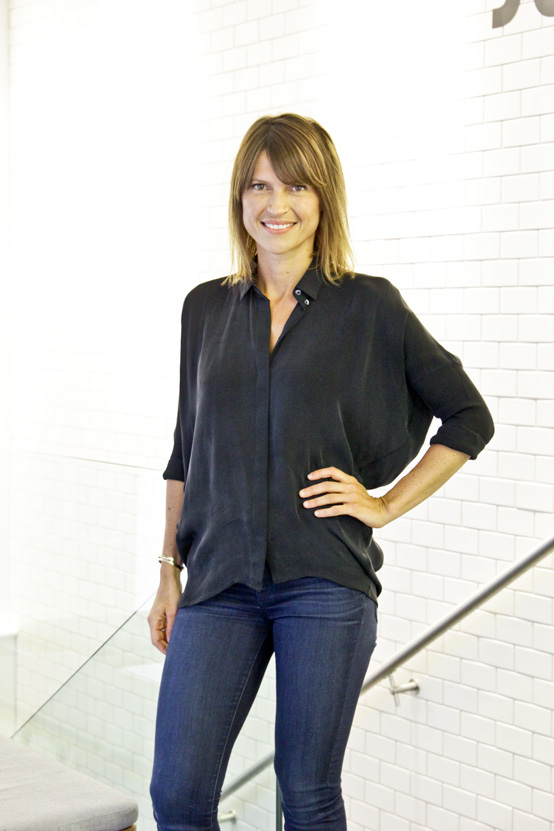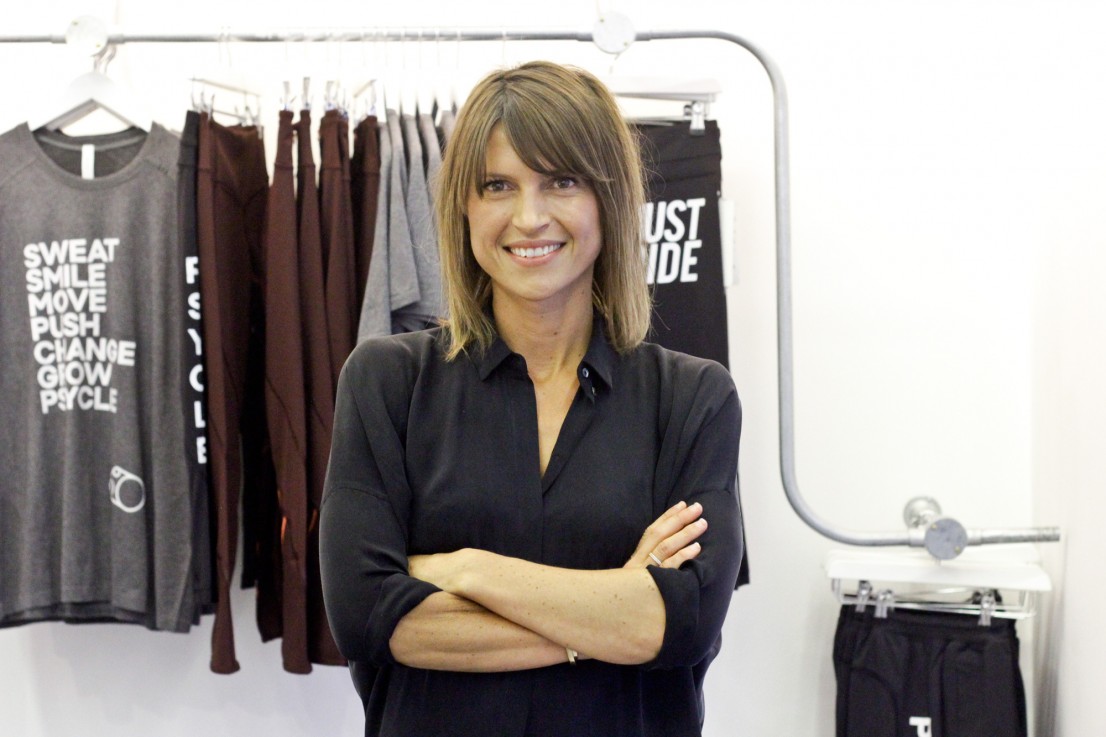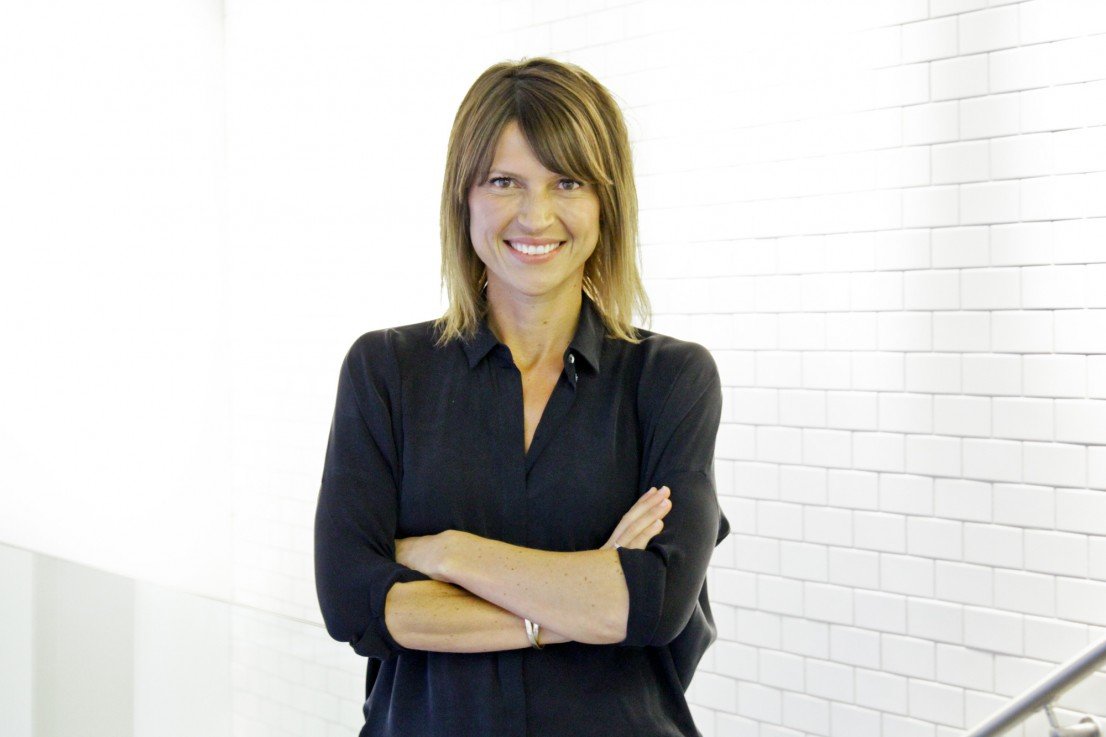Real talk for a second: mustering the courage to go to the gym is hard. Show of hands, who many of you became a member of a swish gym or the like back in January only to throw in the towel in favour of Netflix and chill in the most literal sense? Seriously, the struggle is real. If you’ve been to Psycle though, you’ll be well aware that building up to make the journey in to your closest studio is in fact, the easiest part.
We’re one of the 4,300 odd people who take the weekly pilgrimage to Psycle, the addictive form of torture known as much for the volume of sweat exuded and calories blitzed as it is for the internal therapy. Each 45-miute class is like an ordinary spin session, crossed with a full-blown night out worth of choreography, crossed with your average gym session. The classes are hot; the music upbeat to distract you from the burn; and there’s so much pedalling, boxing and weight-lifting that you probably won’t be able to feel your arms, legs or backside when you jump off. Oh, and just about every bike is preoccupied with #GirlBosses (in that Beyoncé acceptable way), you know, a magazine editor here, a top business exec there, all sporting Alexander Wang sports bras and Lululemon leggings. Moments after the doors close and the lights go down, riders are in a seemingly euphoric state, which goes a long way in explaining why we all come back time and time again.
Rhian Stephenson is the woman behind it all. As CEO, she’s the person calling all the shots. A former swimmer for the Canadian national team and a trained naturopath, nutritionist and herbalist, she’s pretty much made a career out of transforming people’s lives from a holistic perspective. She’s also the queen of making even the most reluctant people want to work out. In fact, she’s taking my class today (she still teaches three classes a week). She has one arm on the handlebar, while the other fiddles with the dials on a mini DJ booth attached to the chassis of her bike. She’s mixing N.E.R.D with Rihanna, Diplo with Major Lazer – all the while shouting instructions, encouraging the room to fight through the pain and remember why they came here.
[show_shopthepost_widget id=”1431011″]
It’s that special blend of the physical and mental that makes what Rhian has created at Psycle so special. She’s made it her mission to inspire women (and men) to be the best they can be in all spheres of their lives. Health, she tells me, is foundation but it extends far beyond that. It’s partly why she’s made a point to nurture and harness the tribe of like-minded individuals they’ve been able to grow since Psycle opened back in 2014. Even last month, I watched her to talk candidly to a crowd of women at Kit & Ace about the power of creating value-based intentions in relation to health but also in love, life and career too. And she’s refreshingly candid about her experiences. About missing her friends and family after leaving her native Canada to move here; about the life adjustments that were part and parcel in her taking the top job; and why keeping active is the one thing that keeps her centered. It’s watching the emotional and physical transformations of ‘riders’ that keep her inspired, she tells me. Seeing people morph from being in a place where they are unhappy with their health to a place of strength, vitality and confidence. It’s all about creating an atmosphere of unity at Psycle, she says. A place where you don’t have to worry about people looking and judging. It’s about being caught in the moment and feeling like you’re part of something.
Naturally, she’s been on our hit list of people to talk to for the beginning so here, she shares some anecdotes about her journey, some of the lessons she’s learned along the way and why we owe it ourselves to push ourselves to the next level, take risks and quit fearing failure.
 On where her interest in health and wellness started: I was always pretty sickly as a child – sinus infections, chest infections, headaches, stomach aches. It was endless. It wasn’t until I went to see a Naturopath that I started to get better, and then my health and energy transformed. So for me it was more of a personal journey that brought me to where am today. The Naturopath who treated me also ran her own clinic, so I shadowed her and then completely fell in love with naturopathic medicine. Sport has been a great foundation for me. Swimming at a national level gave me a huge sense of accomplishment, confidence and discipline. It’s also amazing camaraderie and there’s a big sense of community, which is one of the things that I love about Psycle. It’s given me that feeling back which is one of the things I’ve missed most.
On where her interest in health and wellness started: I was always pretty sickly as a child – sinus infections, chest infections, headaches, stomach aches. It was endless. It wasn’t until I went to see a Naturopath that I started to get better, and then my health and energy transformed. So for me it was more of a personal journey that brought me to where am today. The Naturopath who treated me also ran her own clinic, so I shadowed her and then completely fell in love with naturopathic medicine. Sport has been a great foundation for me. Swimming at a national level gave me a huge sense of accomplishment, confidence and discipline. It’s also amazing camaraderie and there’s a big sense of community, which is one of the things that I love about Psycle. It’s given me that feeling back which is one of the things I’ve missed most.
On her career journey: My career was quite varied, so I mixed it up between clinical practice, brand/corporate consultancy, cooking demos, seminars and retreats. I loved how varied it was and ultimately it’s how I met the people involved in Psycle. I worked in clinic for two years before I went out on my own, so by the time I wanted to set up I had a solid client base and never had to advertise, all of my clients and brand consultancies were word of mouth, so I was extremely lucky. I set up my consultancy not because I was trying to fill a gap in the market but more because I wanted freedom and creativity in my career to allow me to work in different specialties and settings. Setting up on my own was the natural step for me and things transformed from there. I think it’s important to go with your gut – I didn’t really know how successful it would be, but I knew what I wanted to feel and achieve, which made my path easier to follow.
On the reality of being freelance: You need to be driven, you need to be confident in what your specialty is – what makes you unique from others – and you need to be clear on what you want so that you know when to say no to things. When I first started freelancing I said yes to pretty much everyone and I spread myself incredibly thin. Meanwhile time was passing and I wasn’t developing half of the things I had set out to do as a freelancer, so it was frustrating for a while. I was incredibly busy (which was great!), but I wasn’t doing the stuff I had left full-time work for. It’s really important to have a purpose in mind. If you are thinking about going freelance, I’d definitely recommend thinking about your pricing before taking the leap and also making time to figure out how quickly you’d be able to start generate revenue. I was able to transition quickly because I already had established client base so I didn’t need to have much money saved away. If you’re starting from scratch though, always overestimate how much you think you’ll need to get going. A good starting point is to think how much of savings you’ll need to operate and maintain your lifestyle for a minimum of six months.
On joining Psycle as a consultant before coming on board as CEO: I joined about eight months prior to the launch, so it was still at quite a formative phase when I joined. The transition was quite unexpected – the opportunity presented itself and I went for it. When we launched two years ago there was still quite a big gap in the boutique, pay as you go market. We came in at a time where Londoners were getting more engaged with health and fitness while craving variety and flexibility. Most importantly though was the gap for a workout that is actually incredibly fun yet challenging and effective. I am incredibly passionate about the brand because it marries my love of fitness with wellness & nutrition, so for me it felt like an exciting challenge that was totally in line with everything I stand for. As a CEO today, I think authenticity, empathy and leadership are really important, especially in people or experiential brands. At Psycle, it’s all about our brand culture, our people and our instructors. We all truly believe in what we have set out to do, so riders feel that and become a part of the community from the first time they visit.
On changing attitudes to health & wellness: A big part of my job is keeping an eye on the market but the biggest change I’ve seen is actually in the mindset of customers. Before, you were either going to exercise, stay in and have a ‘healthy’ night, or you were going to go out and indulge. People generally seemed to exercise with weight as the main motivator too. Now it’s all about balance, enjoyment and all the other benefits exercise can give you. It’s become a part of people’s lives, which they genuinely love and enjoy. The biggest challenge in the beginning was getting people to understand what Psycle is. It’s so much more than a workout – it’s the feeling you get on top of the physical workout that really drives people to Psycle. It’s not something that’s easy to explain to someone who has never done a class.
It’s okay to say no. I used to try to do it all, which inevitably ends up being totally counterproductive. You just end up doing too many things badly rather than a few things to an incredibly high standard. It’s also so hard to get a work life balance if you feel the need to say yes to everything. If you are clear on your purpose and objectives, you’ll be able to say no to the things that won’t help you get there.
On the difference between running her own company and being at the helm at Psycle: Accountability is key. When you’re on your own, it’s too easy to put things off, especially the little jobs nobody likes doing. It’s also easier to hold back and not go for things when you’re on your own. When you run a company you’re fully responsible for everything – the business outcomes, upholding the company values so that execution and perception of the brand is in line with the vision, as well as the general happiness of the team. It forces you to step up and keep pushing forward even if things are difficult. It’s a huge challenge to try to steer the business in the right direction with everyone’s best interests in mind. At the same time, it’s incredibly exciting to work as a part of a team – sharing in the successes of Psycle is far more rewarding than anything I experienced on my own.
On actively pursuing opportunities that push her outside of her comfort zone: I think I still have an athlete’s mentality: I always want to push to the next level, get better and feel like I’m growing and developing. That mindset makes you less afraid of risks because you’re less afraid of failure. In sports, you fail at something every week – there’s always someone better, faster, stronger. Winning is an exception not a norm, so getting into a growth mentality for business is incredibly helpful. It allows you to step outside of your comfort zone without having a huge fear of messing up. If something doesn’t work, see what you can do differently and what you learned, then try again.
On learning to let go: Delegating is one of the most difficult but most important things to do – I’m still learning to be honest. You need to build a team around you that you trust as the first step. If you can’t trust your team to roll things out then there’s a problem. Communication is the second thing – even if someone makes a mistake, quick, honest feedback and communication is the key to ensuring that you’re back on the same page and that it isn’t likely to happen again. That’s the best way to build trust and ensure that you can start to delegate with confidence. It’s better for the team as well. If everyone feels micromanaged all of the time, it will impede their growth and probably start to affect how motivated they are.
[show_shopthepost_widget id=”1431019″]
On dealing with pressure and stress: Exercise and nutrition are the most important things for me to ground myself in. When I don’t exercise, the stress builds up and when work is full on I need an escape and a release. Likewise if my nutrition is solid, my mood is better, I’m more energetic and my immune system is strong. If you feel strong and healthy, everything is easier.
On following her instinct professionally: It’s important but it’s definitely difficult for a lot of people including myself. My gut instinct is quite strong but it’s so easy to talk myself out of things for fear of looking bad, worrying about what other people think or just a fear of the unknown. Every time I’ve talked myself out of doing what my gut has told me to do it’s ended up being the wrong decision. It’s hard to give people a solid rationale when you are making a decision based on your gut, but you just need to trust yourself. Start to keep track of what happens when you follow with your instinct so that you can slowly build confidence in your decisions.
On the importance of mentors: I’ve met so many inspiring entrepreneurs. I always bounce ideas off of people and have had incredibly helpful advice that’s helped me navigate some tough decisions. I think that building a network of mentors is a fantastic way to learn from other people’s experiences and also just to be able to talk things out with someone outside of your business for a fresh objective view.
On the advice she wished she’d been given: It’s okay to say no. I used to try to do it all, which inevitably ends up being totally counterproductive. You just end up doing too many things badly rather than a few things to an incredibly high standard. It’s also so hard to get a work life balance if you feel the need to say yes to everything. If you are clear on your purpose and objectives, you’ll be able to say no to the things that won’t help you get there.
This interview has been edited and condensed. Rhian was shot in Psycle’s Mortimer Street studio.


